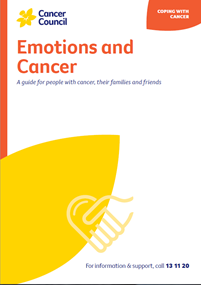- Home
- Cancer Information
- Advanced cancer
- Living with advanced cancer
- The people in your life
- The effect on people close to you
The effect on people close to you
You may sometimes feel the hardest part about having advanced cancer is the effect on your family and friends. They may need time to come to terms with the prognosis. You may want family to speak to your health care team, especially if they have trouble accepting the news or will be involved in your care and treatment.
Learn more about:
- The effect on partners
- Changes in sexuality and intimacy
- When children take on a caring role
- Video: Support for families and friends of people with advanced cancer
The effect on partners
The emotional support provided by a partner can affect how you cope with the diagnosis. Not knowing what the future holds, financial worries, and feeling isolated can challenge a relationship. And partners can feel just as distressed, depressed and anxious as the person with cancer.
Being open and honest with each other may help you both cope with sadness and uncertainty, and your relationship may grow stronger.
Differing emotions, ideas or opinions can lead to tension. Your partner may not want to talk about the cancer or may distance themselves to cope. To avoid tension, tell your partner what you need most. Let them know if listening to you is more important than what they say.
Explain that you’re grateful for their support and you know it’s hard for them too. If them doing everything for you is upsetting, tell them that it’s important for you to feel involved, and independent, even if it’s just in small tasks.
Good communication with my partner was a blessing. It was the total difference in being able to cope.
Kaye
Changes in sexuality and intimacy
Humans are sexual beings, and intimacy can add to the quality of our lives and help us to connect. Depending on where the cancer has spread, or the type of treatment you’re having, you can feel sore and find even a gentle hug uncomfortable. Your partner may avoid physical contact for fear of rejection, or out of concern that they will cause you pain. It takes time to adapt to physical and emotional changes. Most people find it is easier to re-establish contact by lying close together in bed.
If sexual intimacy is no longer possible or what you want, you may prefer to cuddle, stroke or massage. It can help to talk about your feelings and concerns about any sexual changes in your relationship.
For more on this, see Sexuality, intimacy and cancer.
When children take on a caring role
For many families, it’s natural to want to look after a parent-figure, or a sister or brother, if they are unwell. This may also be the most practical option if you’re unwell. But it also means that your child or sibling may help or care for you in a way that you’re not used to.
Being reliant on someone you are used to looking after may be stressful or upsetting. You may feel frustrated or that people are interfering or doing things you never expected them to do. It may seem like an invasion, even if you are grateful for help. Or like you’re being told what to do, when you already feel like you have no control. These role-reversals can be difficult for both sides. Try to be honest about what you are happy for family to do for you now, and in the future. You can consider home help or talk to a social worker about other options.
→ READ MORE: Talking to children about advanced cancer
Video: Support for families
Podcast for people living with advanced cancer
Listen now
More resources
Dr Lucy Gately, Medical Oncologist, Alfred Health and Walter and Eliza Institute for Medical Research, VIC; Dr Katherine Allsopp, Supportive and Palliative Care Specialist, Westmead Hospital, NSW; A/Prof Megan Best, The University of Notre Dame Australia and The University of Sydney, NSW; Dr Keiron Bradley, Palliative Care Consultant, Medical Director Palliative Care Program, Bethesda Health Care, WA; Craig Brewer, Consumer; Emeritus Professor Phyllis Butow, Psychologist, The University of Sydney and Chris O’Brien Lifehouse, NSW; Louise Durham, Palliative Care Nurse Practitioner Outpatients, Princess Alexandra Hospital, Metro South Palliative Care, QLD; Dr Roya Merie, Radiation Oncologist, ICON Cancer Centre, Concord, NSW; Penny Neller, Project Coordinator, National Palliative Care Projects, Australian Centre for Health Law Research, Queensland University of Technology, QLD; Caitriona Nienaber, 13 11 20 Consultant, Cancer Council WA; Xanthe Sansome, Program Director, Advance Care Planning Australia, VIC; Sparke Helmore Lawyers; Peter Spolc, Consumer.
View the Cancer Council NSW editorial policy.
View all publications or call 13 11 20 for free printed copies.
Need to talk?
Support services
Coping with cancer?
Speak to a health professional or to someone who has been there, or find a support group or forum
Need legal and financial assistance?
Pro bono services, financial and legal assistance, and no interest loans
Cancer information
Dealing with the diagnosis
Common reactions to a cancer diagnosis and how to find hope
Explore our resource hub
Explore and download our booklets, fact sheets, podcasts, webinars and videos for people affected by cancer

